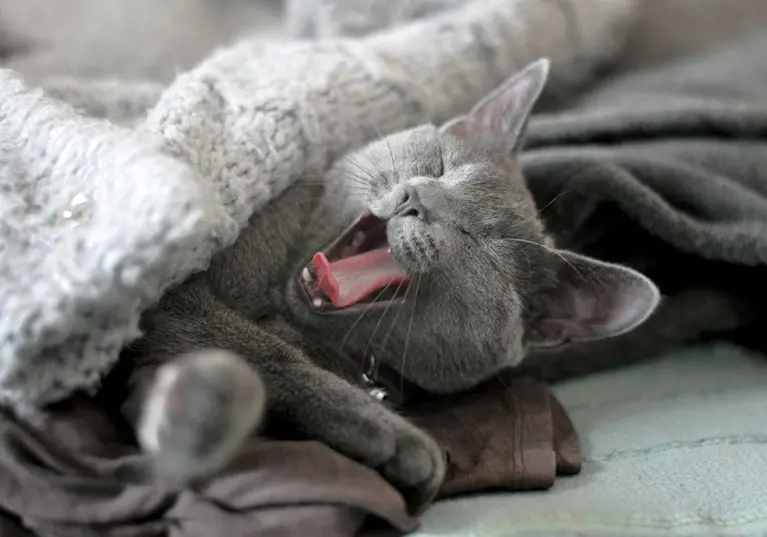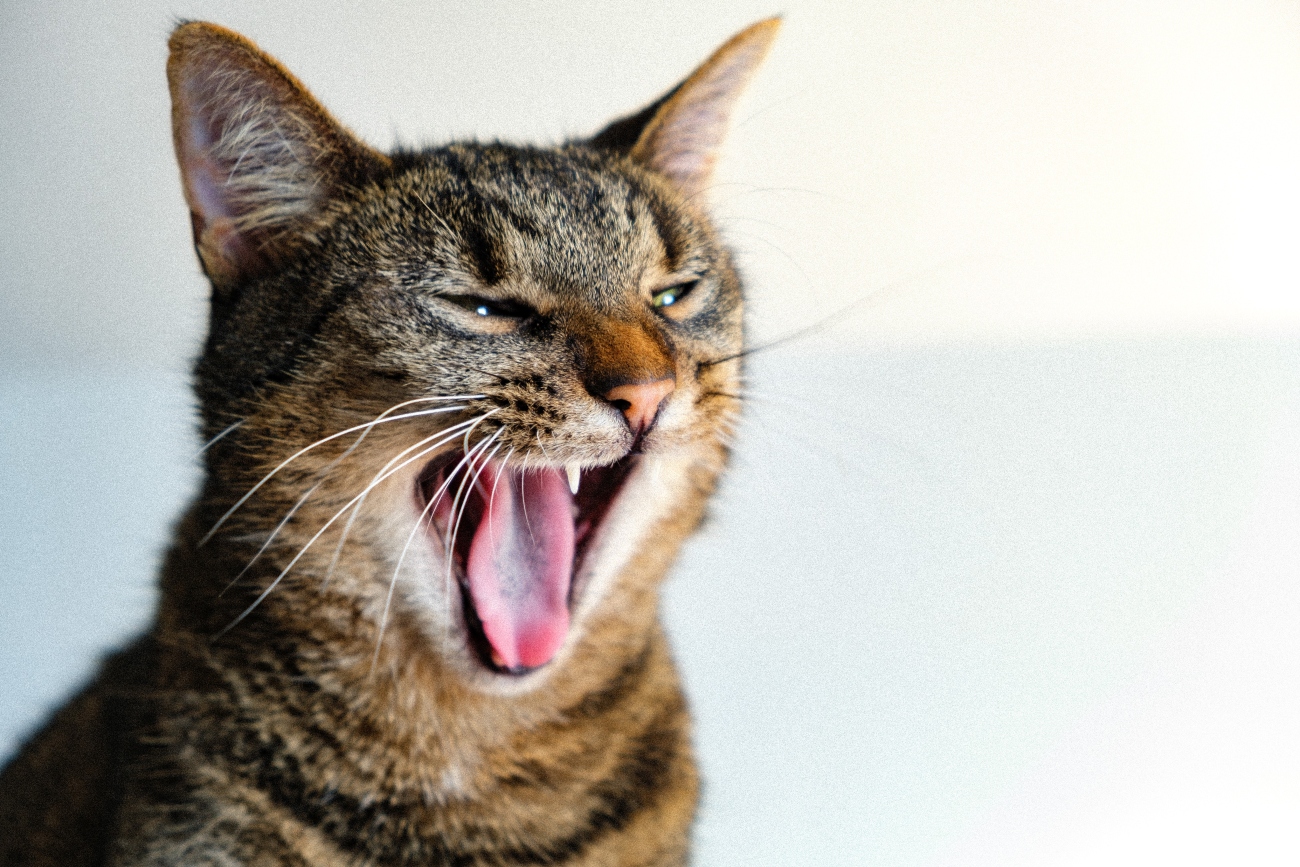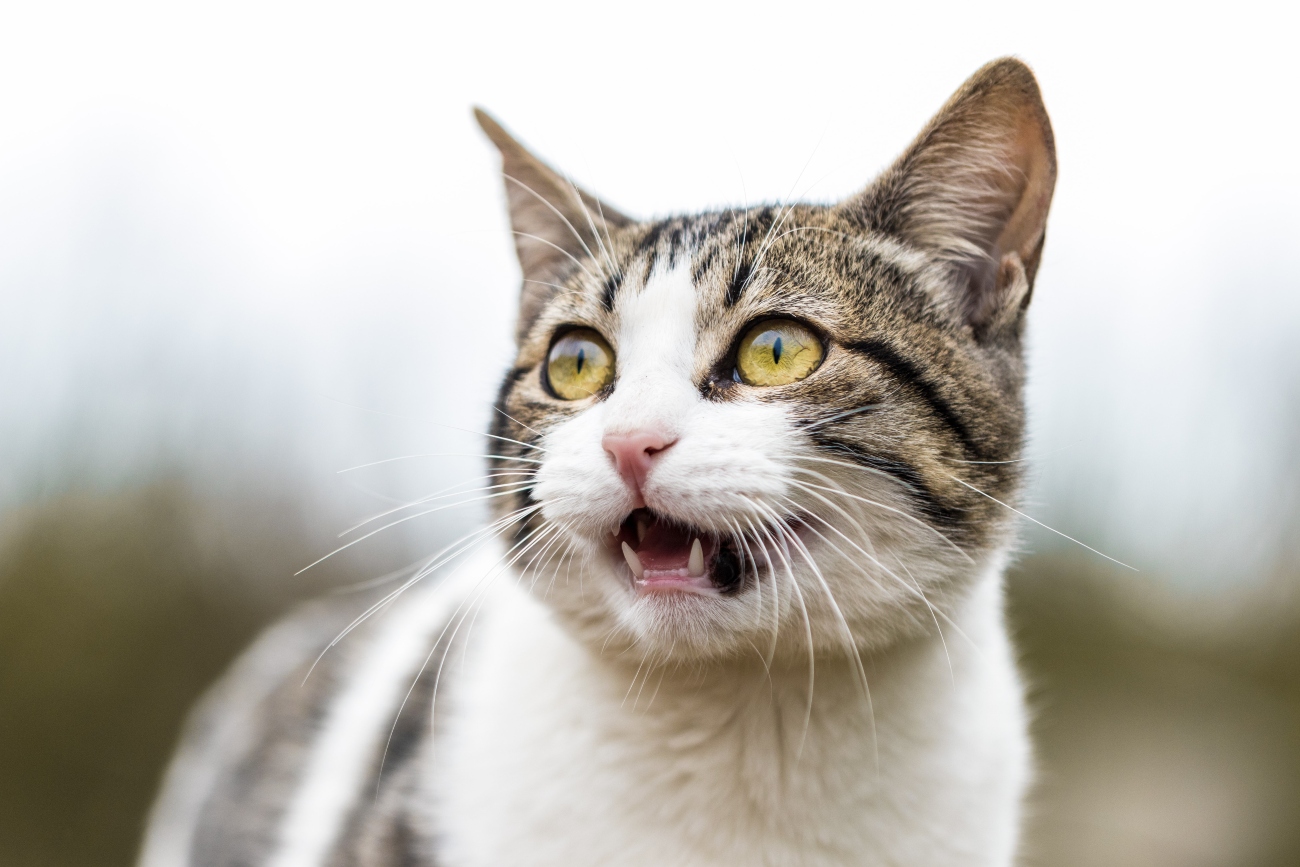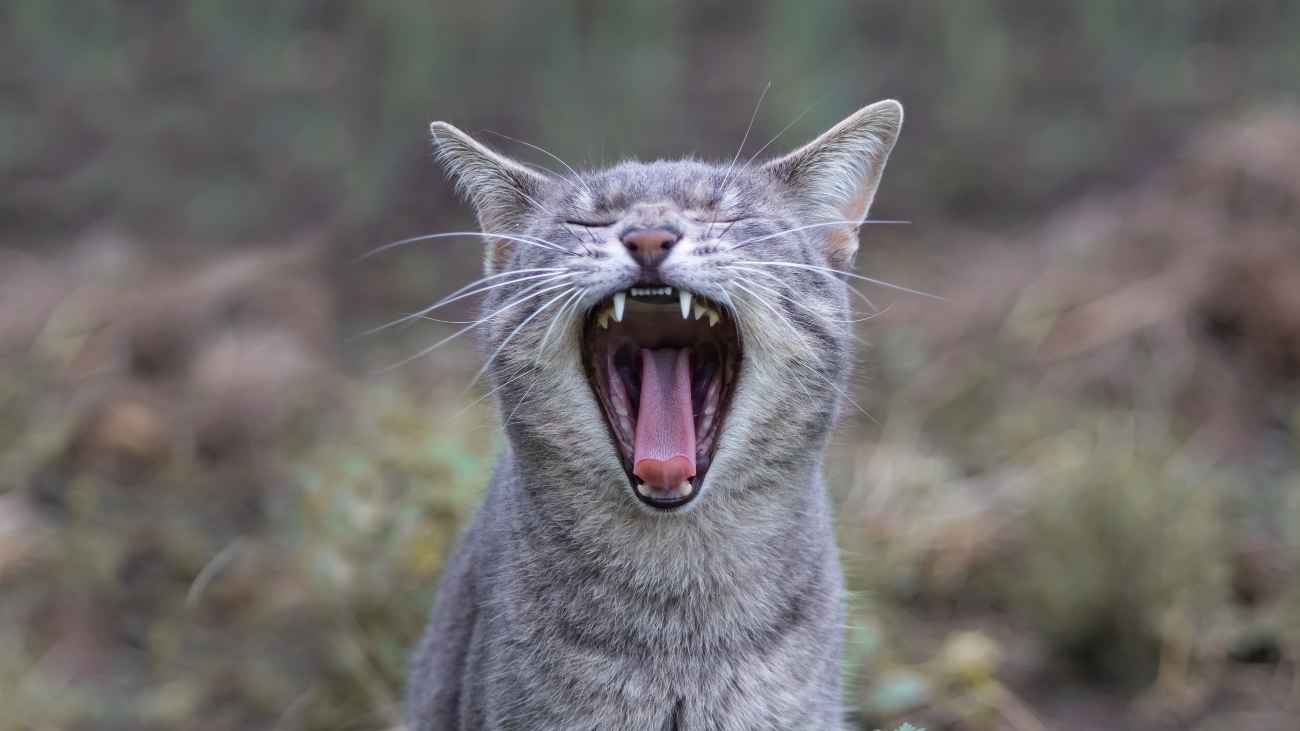Why does my cat have bad breath?
28th January, 2022

Snuggling up on the sofa with a feline friend is something we all look forward to. But sometimes even the most devoted of owners can be put off when their cat is suffering from bad breath.
While you still love them, you should never ignore a nasty niff – it could be a warning sign of a serious health condition. So why do cats sometimes get bad breath? And what’s the answer to the pong problem? Let’s take a look.
If you notice your beloved cat has developed bad breath, don’t worry. If you’ve got cat insurance from Purely Pets help is on its way! There are plenty of ways a vet can be of service. Give our caring team a call today and get your cat protected now.

Why do cats get bad breath?
It’s not natural for cats to have an unpleasant smelling breath, so it should never be ignored as ‘just one of those things.’ While the cause might not be too serious yet, a nasty odour needs investigating by your vet. As well as the bad breath you also need to be on the lookout for these warning signs and tell your vet if you spot them:
- Pawing at the mouth or teeth.
- Chewing on one side of the mouth.
- Gingivitis (inflammation of the gums).
- Difficulty eating or dropping food.
- Difficulty swallowing.
- Eating less or nothing at all.
- Weight loss.
- Excessive drooling.
- Blood in their saliva.
- Lethargy (tiredness).
- Not allowing you to stroke their head.
- Sneezing or nasal discharge.
- Swelling around mouth or jaw.
- Changes in behaviour.
The most common causes of bad breath in cats are detailed below. We’ve also included a bit of guidance on what to do. But remember, there’s no substitute for getting your pet to a vet. If you have cat insurance in place, you may not have to worry about the cost of treatment.
Tooth and gum disease
Perhaps the most common cause of bad breath in cats is tooth or gum disease caused by poor dental care. A build-up of plaque and tartar will lead to the growth of the oral bacteria that cause bad breath.
Over time, if the plaque and tartar is not removed by brushing or other chewing action, then it can even force the gums away from the teeth. This then exposes yet more areas of the tooth on which harmful bacteria can develop – and so the problem gets worse.
This not only causes inflammation of your cat’s gums (gingivitis), but it can also lead to cavities, infection, tissue destruction, and even tooth loss.
We’ve got more top tips for looking after your cat’s teeth elsewhere on the Purely Pets blog.
What to do: The most obvious solution is to prevent tooth and gum disease from happening in the first place. So, get into the habit of brushing your cat’s teeth regularly from a young age.
Most cats will adapt well to tooth brushing, just remember to use a specialist cat toothbrush and toothpaste. Using human products is not suitable and may even harm your cat.
Training your cat to accept tooth brushing is relatively straightforward. Follow these five steps to success and they’ll have sweet-smelling breath in no time!
- Buy some feline toothpaste suitable for cats and a soft toothbrush from your vet.
- To get them used to the flavour, smear a small amount on your finger and let them lick it off.
- If this goes down well, then start to gently rub your finger around their teeth. Try to follow the gum line to get them used to the sensation.
- Now try touching their teeth with the toothbrush. Simply allow them to lick the toothpaste off first. Then you can move on to gentle brushing. Reward them with a treat for doing so well.
- Brushing should be repeated every day or two. Or at an absolute minimum, once a week.
Whatever the age of the cat, International Cat Care recommends owners should establish a daily routine for dental care. Choose a convenient time to make sure brushing is done every day. Your cat will also appreciate this routine.
As well as brushing, try giving them a cat dental chew or toy to help clean the teeth through the natural chewing motion. Chew toys shouldn’t be harder than your fingernail, and should be specifically designed and made for cats.
Don’t delay in arranging a dental check-up if you suspect your cat has tooth or gum disease. If the problems are not too severe then your vet might be able to simply clean the teeth under general anaesthetic. Treatment can also include the use of antibiotics or anti-inflammatory medicine.
However, if you ignore these types of problems then your furry friend can soon start to lose teeth and issues may even start to spread to other parts of the body. Unfortunately, as Cats Protection states, cat tooth issues can often result in tooth extraction.
Be aware if you’re a lover of pedigree cats. PDSA warns that as well as age and diet, purebred cats such as Persian, Maine Coon, Burmese and Siamese are more likely to suffer from dental disease.

Diet
Once you’ve ruled out any oral health issues with your cat then it might be time to take a look at what you’re feeding them. Some cat foods can cause more smelly breath than others. Many commercially available cat foods contain fish or liver-based ingredients. While these have health benefits for your cat, they can give a fishy whiff to their breath if they’re eating them several times a day.
What to do: While the pong caused by this type of food causes no harm, if you find it really unpleasant then perhaps try one with a different formulation. That could be the most simple fix to the problem. Some owners also find that changing from a wet to a dry food solves the problem. But never rely solely on ‘kibble’ as the answer to your cat’s dental health needs.
Speak to your vet for further advice about the best food and supplements for your particular cat. Perhaps a prescription diet designed to maintain dental health is needed?
Something stuck in their teeth
Cats are natural hunters and are always on the lookout for items to ‘kill’. Unfortunately there’s a whole host of household items such as string, rubber bands and so on that they might decide to perform their killer instincts on. If parts of these break off and get stuck in their teeth it could cause an infection and an unpleasant smell.
What to do: Keep an eye on what they are playing with. Try to restrict them to their cat toys. If pieces start to break off then replace them. This will avoid choking hazards, too.
Coprophagia and pica
Chomping on their own or another cat’s faeces is called coprophagia. While eating non-food items such as plastics, fabrics and rubber is called pica. Both of these can cause bad breath alongside other health problems and need to be investigated by a vet.
What to do: Aside from picking up faeces and other objects they shouldn’t be eating, start by speaking to your vet. If you think boredom might be part of the problem, provide some additional environmental enrichment or consult an animal behaviourist.
Stomatitis
While gingivitis refers to inflammation of the cat’s gums, feline stomatitis occurs when most or even all of the cat’s oral tissues are affected. This can cause severe inflammation of the gums, tongue, inner surfaces of the lips, and the floor and roof of the mouth. It’s very painful and can cause very bad cat breath.
What to do: Your vet will need to remove all traces of plaque and tartar on the teeth. Many cats will also need to be prescribed antibiotics, chlorhexidine rinses or gels, and anti-inflammatory medicines.
Kidney and liver disease
As with all animals, your cat’s kidneys and liver play a vital part in their overall health and well-being. Bad breath is just one in a long list of potential symptoms that can lead to a diagnosis of kidney or liver disease in cats.
If your cat’s kidneys become overwhelmed and are unable to detoxify effectively anymore then you may notice their breath smells like ammonia (similar to bleach). The cat food experts Purina have a particularly useful guide on kidney problems in cats that’s well worth consulting.
If you notice a particularly foul, sweet, musty breath then they might have a problem with their liver. You might also notice yellowing of the whites of the eyes or yellowing of the skin on the ears.
What to do: Suspected kidney and liver disease needs to be investigated by a vet as a matter of urgency. A very useful benefit of arranging cat insurance through Purely Pets is the free 24-Hour Vet Helpline for all customers. There really is no better way to put your mind at rest, at any time of day or night.

Diabetes
A sweet or fruity smell (similar to pear drops) is a symptom of a condition called diabetic ketoacidosis. This is a serious and life-threatening complication of diabetes mellitus and can occur in cats. Other signs that your cat might be suffering from diabetes include:
- Increased thirst and urination.
- Increased hunger.
- Weight loss.
- Low energy.
Diabetes is most common in male cats, overweight cats, and those older than 10 years. It is also more common in some breeds of cat such as Burmese.
What to do: Book an immediate vet appointment. Many people believe that the type-2 diabetes that cats usually suffer from doesn’t need insulin injections. However, type-2 diabetes in cats is slightly different and can be treated with insulin and a well-controlled diet.
Pet charity PDSA has lots of further information on diabetes and other cat health problems that could lead to smelly breath.
Gut problems
An infection or blockage in your cat’s gut can cause their breath to smell. However, you’ll probably have already been alerted to this by other more obvious signs. These include vomiting, diarrhoea and stomach pain.
What to do: PDSA vets treat over 2,700 pets a year that have eaten a so-called ‘foreign body’. Examples of objects commonly found in cats include thread, tinsel, string, rubber bands, balls and even toys. If you suspect your cat has eaten something like this then it’s probably wise to call your vet. If a gut blockage is left untreated then it could lead to serious illness or even death.
Respiratory infections
Bad breath might also be a sign of an infection in your cat’s throat, lungs, or sinus. While most respiratory infections are caused by viruses such as feline herpes virus and feline calicivirus, some cats develop secondary bacterial infections, too.
What to do: Keep up to date on immunisations and pay regular visits to your vet to keep these problems at bay.
Mouth cancer
Cancers that develop in the mouth can become infected and cause your cat’s breath to smell. You might also notice blood-stained saliva and problems eating.
What to do: As ever, when it comes to mouth cancer, early detection is key for successful treatment. So, if you’re at all concerned then an urgent trip to see your vet is essential.
Find cat insurance through Purely Pets
It’s important not to ignore tell-tale signs of feline dental concerns. Check for the warning signs – such as bad breath, bleeding or inflamed gums, drooling, difficulty chewing, or refusal to eat – and take action, fast.
Don’t wait until your cat shows signs of distress. Always follow a daily dental routine, provide an appropriate diet, and take them to the experts for regular check-ups.
Owning a cat can give you so much, so you need to make sure you give back to your cat, too. Having insurance for your cat is the best way to ensure they are treated quickly and make a swift recovery.
At Purely Pets, we’ve designed 15 levels of cat insurance so you can find the right cover for your feline friend.
Get a quote for cat cover today.
Helpful Pages
Recent Posts
Pet Insurance Quote
- 98% claims paid *
- Claims paid directly to vets
- 24/7 vet video consultations
- Interest free monthly payments




